Cayman News
Cayman News's Latest Posts
Chamber plan would pedestrianise George Town
(CNS Business): The Cayman Islands Chamber of Commerce has suggested closing the centre of George Town to traffic for most of the day and at night as part of an action plan to revitalise the capital. Under the plan, cruise ship passengers could stroll safely around town, and at night restaurants could bring tables out to the roads so that people can stroll the streets looking for a bite to eat. Beggars would be escorted away, while folk dancers in costumes would be hired on cruise ships days to perform in Town Square. A farmers’ market and local crafts would be encouraged and the Chamber Council also envisage a ‘hop-on, hop-off’ free trolley service as well as increasing the amount of vegetation and shaded areas. Read more on CNS Business
Brac hotel closing in April
(CNS): The 16 staff members of The Alexander Hotel on Cayman Brac have been informed that they will be out of their jobs on 13 April. Just a few months ago the developers proposing to turn the pond next to the Alexander into a marina admitted that the project would require an environmental assessment, but now that Cabinet is requiring this to be done before considering the associated coastal works licence, Cleveland Dilbert, the front man for the developers, has responded by announcing that he is closing his hotel. According to the strategic outline case presented to Cabinet last November, if government gave the go-ahead to the proposal, it would have to commit to purchasing from Scott Development KYD $3.5 million of fill excavated from crown property as a result of the project.
The 31-room Alexander, which was completed in 2009, lies some distance from the nearest sandy beach and was built right next to Saltwater Pond, that is at times quite stinky. Unsurprisingly, the hotel has been running at a loss.
According to the strategic outline case (SOC) presented to Cabinet by Brac Development Company (BDC), it has only averaged 25% occupancy and the owners have had to invest about KYD $150,000 each year to keep it going.
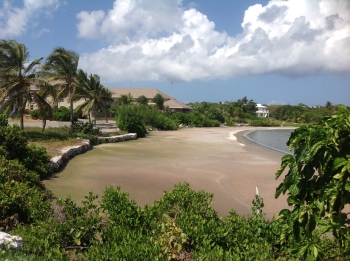 Nevertheless, the marina is “not intended for profit of BDC Ltd or its shareholders”, Dilbert stated in a letter accompanying the SOC presented to Cabinet on 4 November 2013, which he has now made public. It was, he said, “intended for the betterment and welfare of the people of Cayman Brac and the island’s economy”.
Nevertheless, the marina is “not intended for profit of BDC Ltd or its shareholders”, Dilbert stated in a letter accompanying the SOC presented to Cabinet on 4 November 2013, which he has now made public. It was, he said, “intended for the betterment and welfare of the people of Cayman Brac and the island’s economy”.
(Right: when the Saltwater Pond dries up, the sludge emits a strong and unpleasant smell, which is not good for the Alexander's open bar.)
As well as the significant commitment to buy from a private company the publicly-owned excavated material extracted from crown property, public funds would also be needed to build an alternative route round the north side of the pond, connecting Rebecca's Cave Road with Bluff Boulevard, since the channel would cut through South Side Road West. Against this, the SOC lays out a long wishlist of financially positive outcomes for the project that have not so far been supported by a detailed business case. Nor does the proposal offer any guarantees that, once started, the project will be completed as planned.
“BDC Ltd is certainly supportive of the Department of Environment’s pursuit of a prudent balance between the built environment and the natural environment,” the developers wrote in their SOC before the DoE Technical Review Committee laid out a catalogue of environmental red flags when it assessed the coastal works application to cut a channel through the road, the ironshore and the fringing reef.
The DoE also noted that the application was incomplete in several key areas, including an explanation of how, with a single jetty, BDC planned to create a 100-foot wide channel using an excavator with a 40-foot reach. Nevertheless, Dilbert apparently expected Cabinet to approve the application without an EIA and has now closed his hotel in protest.
“As developers we are committed to working in partnership with the CIG [Cayman Islands Government] and to construct the safe harbour in a way to minimise negative impacts to the natural environmentas much as possible. As residents of the Cayman Islands, therefore stakeholders, we identify the economic social and natural importance of a healthy marine environment. This project will require an environmental assessment to identify any negative effects and suggest methods that can be used to avoid or minimise and mitigate them,” the SOC stated.
BDC laid out five options for cabinet in the SOC: If the coastal works application is rejected (Option 1), apparently government will be forced to deal with the stinky pond themselves, which will be an on going expense.
Both Option 2 and Option 3 result in government giving Scott Development $3.5 million for 218,750 cubic yards of fill, either paid upon delivery of the fill, which would be “stockpiled for use on future projects” (Option 2) or paid in monthly installments (Option 3).
Option 4 is to partially develop the marina with no government financial participation. Instead of making the entire pond into a safe harbour, the developers would just develop a section of the west side of the pond behind the Alexander, purchasing land and cutting the channel between the Coral Isle Club and the residential homes to the west. The basin would be approximately 250' x 250' with a depth of 18 feet, according to the SOC, which stated, “Our concern is that this option appears to be solely for the benefit of The Alexander Hotel and not the surrounding landowners.”
However, in Option 5, even though the SOC repeatedly states that the marina project is for the good of the people and the economy of Cayman Brac, BDC says that if Cabinet rejects their proposal and, deciding that the island does not require more than one safe harbour, instead chooses one of the other marina proposals, the Alexander may close.
In his letter to Cabinet, Dilbert noted that BDC first wrote to the Cayman Islands government with a proposal for the marina in August 2009. He further stated that the company has already been granted permission in principle by the Cayman government to quarry the bedrock in the pond and sell the majority of the shot rock and fill extracted, in order to raise capital to fund the conversion of the pond into a marina.
Vote in the CNS poll: Should Cabinet grant a coastal works licence for the marina at Saltwater Pond on Cayman Brac?
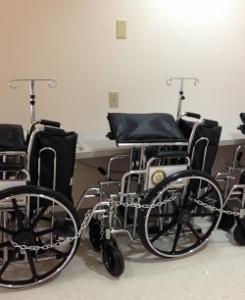
Wheelchairs go walkabout
 (CNS): The Cayman Islands Hospital appears to be suffering from a non-medical epidemic, with 30 wheelchairs having disappeared from the premises over the last five years. Health Services Authority CEO Lizzette Yearwood acknowledged the problem and estimated that each year, anywhere from five to eight wheelchairs go missing. On a daily basis, there should usually be about 10 wheelchairs available for use throughout the hospital, but these days that number is down to eight, she said. The most likely reason for the disappearing wheelchairs, which cost between $200 and $300 each, is that people are simply taking them, with no intention of bringing them back, Yearwood explained. (Photo bySandra Catron)
(CNS): The Cayman Islands Hospital appears to be suffering from a non-medical epidemic, with 30 wheelchairs having disappeared from the premises over the last five years. Health Services Authority CEO Lizzette Yearwood acknowledged the problem and estimated that each year, anywhere from five to eight wheelchairs go missing. On a daily basis, there should usually be about 10 wheelchairs available for use throughout the hospital, but these days that number is down to eight, she said. The most likely reason for the disappearing wheelchairs, which cost between $200 and $300 each, is that people are simply taking them, with no intention of bringing them back, Yearwood explained. (Photo bySandra Catron)
“It is suspected that patients are taking them off the hospital compound and not returning them,” she said. At the moment, there are no security measures in place to prevent the chairs being taken, but the administration is now being forced to take precautions.
Larger hospitals, such as those in the US, employ security staff who routinely guard against wheelchairs being taking off premises, but that requires additional personnel.
“We are in the process of securing the wheelchairs, which includes locking them until they are required by a patient,” Yearwood said. “We have also started to place poles on the chairs to prevent them from being placed in vehicles.”
Patients with trucks can still fit the chairs in their vehicles, however, a point made by Cyndy Ebanks, a nurse in the hospital’s Ambulatory Care Unit. She has been dealing with trying to keep the unit’s lone wheelchair safe for years. In 2006, they received a dedicated wheelchair but it has been an ongoing problem holding onto it.
“Once the chair disappeared for about six months,” Ebanks recalled. “One of the hospital’s security staff saw it in someone’s shed in the Eastern Districts and recognised it. He brought it back to the hospital and after that a staff member donated a bicycle chain. We now keep it locked in a room in the unit.”
Suggesting that porters, who are responsible for in-hospital transport, should always remain with the wheelchairs, Ebanks added, “I’d rather push the patient to the entrance myself so I can bring the chair right back to the unit.”
Another staff member gave examples of wheelchairs being found on the roads after whoever was using them simply left them in the street when they were no longer needed.
Estimates from other hospital personnel put the number of wheelchairs now available as low as five, including the ACU chair, with two dedicated to maternity, one donated to the Critical Care Unit and one “roaming’ chair for the other units and wards.
The Accident and Emergency and dialysis units are the most frequent users, along with elderly or immobile inpatients who need to be transported within the hospital, or outpatients who have to be wheeled to and from their cars. For whatever the use, the issue of wheelchairs being removed creates a continuing hardship. “I am appealing to any one who uses the wheelchairs to ensure they are returned safely so they can be available for the next patient who is in need,” Yearwood said.
Ebanks added her own appeal: “Please bring them back because it could be your mother or father who needs a wheelchair and there aren’t many available. If you have any in your home, bring them to the hospital, no questions asked.”
Yearwood said she would welcome any donations of wheelchairs, and thanked previous sponsors who have helped provide chairs over the years.
WEPS tops child/teacher ratio
(CNS): The West End Primary School (WEPS) on Cayman Brac has a better student/teacher ratio than the Lighthouse School, which is dedicated to special education needs (SEN) students. WEPS has six children for every teacher, compared to a student/teacher ratio of about 7:1 at Lighthouse. At the Brac's Creek & Spot Bay (C&SB) primary the ratio is about 8:1, compared to 9½:1 at North Side, the school with the most teachers per child of all primaries on Grand Cayman other than Lighthouse, according to figures released by the education ministry following a freedom of information request by CNS. However, the ministry's chief officer has said that the data for Cayman’s primary schools indicates no strong connection between the size of the class and students outcomes.
"In fact, some of our largest classes, in some cases including our maximum class size of 28, have the highest rates of progress and achievement in mathematics and English according to the data, whereas other smaller classes, including some of only 5 students, have the lowest progress rates," CO Mary Rodrigues told CNS.
The figures provided (see below) do not include the Little Cayman Education Service, which has three primary students taught by one teacher and one teacher's aide. The numbers include classroom teachers as well as staff for specific areas, such as physical education, music, art and SEN, some of whom teach at more than one school, which accounts for the fractions of teachers in the numbers supplied.
Peripatetic staff on Cayman Brac teach at two schools over three campuses. Since the Creek and Spot Bay schools successfully amalgamated in 2003, the Reception class through Year 3 have been taught at the Creek, while kids in Years 3 to 6 attend the Spot Bay campus.
The total number of primary students on Cayman Brac is 137, from Reception through Year 6. There are seven classes at C&SB, the smallest being Year 1 with five students and the largest being Year 3 with 16. At WEPS there are only two year-group classes in double figures: Reception with 12 children and Year 4 with ten. Of the rest, there is one class of five students, two of six and the others have seven and nine children.
The schools with the highest student/teacher ratio are Prospect Primary (about 19:1) and Savannah (about 18:1). John A. Cumber Primary has the most students, with a current enrollment of 587 and about 16 children per teacher. Red Bay has a ratio of about 15:1, while Bodden Town and George Town primaries each have slightly more than 13 children per full time teaching staff.
The smallest school on Grand Cayman is North Side with 88 students, and the school has a better student/teacher ratio than the next smallest, East End, which has 108 students and slightly more than 12 students per teacher.
Commenting on the figures, Chief Officer Rodrigues pointed out that most researchers support the position that class size is only one factor impacting student outcomes and that teacher effectiveness is a more significant factor in promoting student success.
While there is no clear consensus among international researchers on the impact of reducing class sizes, Rodrigues said, in terms of budget decisions there is consensus that when it comes to raising student attainment, class size reduction policies are not the best option to get value for money compared to others, such as increasing teacher effectiveness.
“Much of the discussion depends upon what the starting point for class size reduction actually is,” she added, noting that in some successful countries, such as Japan, class sizes can be over 40, though most countries maintain primary classes in the low 20's wherever possible.
With regards to very small classes, the chief officer pointed out that some research indicates that reducing class sizes below 10-15 children has no increased benefit and may even have negative impacts.
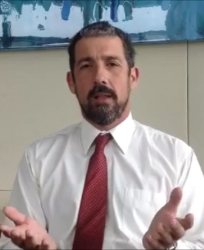
Beneficial ownership registry costly with little benefit
 (CNS Business): Making beneficial ownership information available to the wider public carries significant risks that people living in places that are safe, like Cayman or the UK, forget or do not understand, according to Cayman Finance CEO Gonzalo Jalles. “There are parts of the world where unfortunately, the wealthy are under risk and therefore there has to be right of privacy,” he told CNS Business in this week’s video interview. Representing the umbrella organisation for Cayman’s financial services industry, he said they believe a central registry would add cost to customers for little to no benefit. Read more in CNS Business
(CNS Business): Making beneficial ownership information available to the wider public carries significant risks that people living in places that are safe, like Cayman or the UK, forget or do not understand, according to Cayman Finance CEO Gonzalo Jalles. “There are parts of the world where unfortunately, the wealthy are under risk and therefore there has to be right of privacy,” he told CNS Business in this week’s video interview. Representing the umbrella organisation for Cayman’s financial services industry, he said they believe a central registry would add cost to customers for little to no benefit. Read more in CNS Business
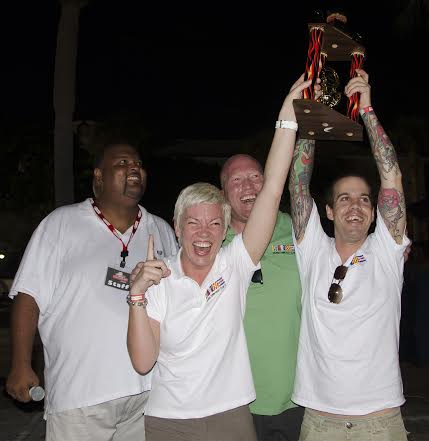
Yacht Club wins Caybrew Chili Cook-Off
 (CNS): While the team from Home Gas Ltd won the People’s Choice Award at the International Chili Cook-Off on Saturday, competing against teams from some of the top restaurants and businesses on the island, the judges picked the chili served up by the team from the George Town Yacht Club. As the winners, they will go on to represent the Cayman Islands in the Chili Finals in October of this year. Hundreds of people turned up to sample the various chilis in the return of the popular culinary event. A close second place overall winner was Craft Restaurant, who also won the Top People’s Choice Restaurant award, vowing to come back next year for the First Place trophy. (Photos courtesy of Home Gas)
(CNS): While the team from Home Gas Ltd won the People’s Choice Award at the International Chili Cook-Off on Saturday, competing against teams from some of the top restaurants and businesses on the island, the judges picked the chili served up by the team from the George Town Yacht Club. As the winners, they will go on to represent the Cayman Islands in the Chili Finals in October of this year. Hundreds of people turned up to sample the various chilis in the return of the popular culinary event. A close second place overall winner was Craft Restaurant, who also won the Top People’s Choice Restaurant award, vowing to come back next year for the First Place trophy. (Photos courtesy of Home Gas)
As well as winning the People’s Choice Award, the Home Gas crew (below with Radio Cayman's Paulette Connolly) took home the third place trophy from the overall judging, and their Texas themed booth was a favourite of the day, with their country music and ‘5 gallon’ hats.
ElectraTech’s Hillbilly booth took Best Booth Award with their hilarious Country slogan signs but was not so successful with their chili, picking up the “Nice Try” last place trophy for the day.
The Blue Dragon Tattoo team won a special prize from Cayman News Service, the media sponsors for the event, for Best Vegetarian Chili, being the only chili in that class. The team has won a month of free advertising on CNS and CNS Business.
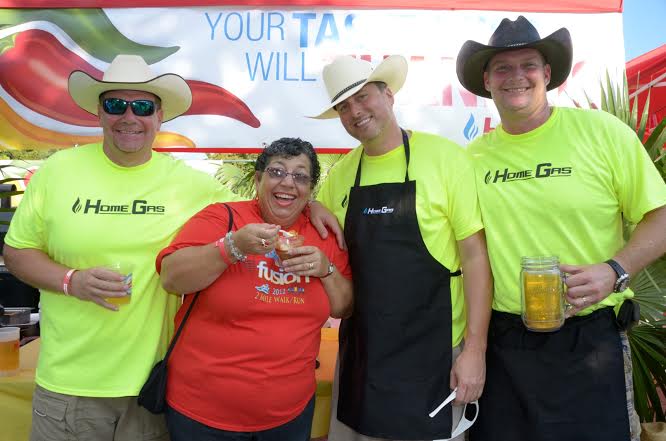
Caybrew’s spokesperson, Matthew Leslie, said that overall the Cayman Islands Brewery was very impressed with the attendance and was already looking forward to next year’s event.
“This was a real showcase and we learned a few things that we will improve on next year, as we can only make this event bigger and better over time. We really have to thank all the sponsors, who came together and made this all possible.”
The definite crowd favourite was the raffle, with prizes including Cayman Airways flights as well as numerous gas grills donated by Uncle Bill’s.
Proceeds from the raffle tickets will be donated to Meals On Wheels, Leslie said. Funds were also raised from the Kids Zone for the West Bay Primary School PTA.
Sponsors included The Cayman Islands Department of Tourism, Home Gas Ltd, Cayman Airways, Uncle Bill’s, Hurley’s Marketplace, CNS Business, Cayman News Service, Radio Cayman, Premier Wines, and Red Bull.
The Caybrew International Chili Cook Off was a sanctioned event by the World governing body of Chili the ICS. The Cayman Islands will be eligible to host the Regional Competition in 2015.

Cayman gears up for Chili Cook-Off
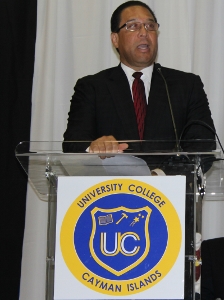
Alden points to election fraud
 (CNS): "Time and again we have heard stories of election fraud, of vote buying – whether its cash in an envelope, a bottle of rum, a new washer or refrigerator," Cayman Islands Premier Alden McLaughlin said at the anti-corruption conference at the UCCI. However, he was not referring to the local polls but elections "the world over". Having emphasised the clean bill of health given to the last general elections in the Cayman Islands by the independent observers, he stated, "We can’t keep ignoring election fraud if we are to truly going to stamp out corruption. Those who are guilty – both the candidate or party and the voter – must own up to it, admit it is wrong and help move their country, its people and the region forward."
(CNS): "Time and again we have heard stories of election fraud, of vote buying – whether its cash in an envelope, a bottle of rum, a new washer or refrigerator," Cayman Islands Premier Alden McLaughlin said at the anti-corruption conference at the UCCI. However, he was not referring to the local polls but elections "the world over". Having emphasised the clean bill of health given to the last general elections in the Cayman Islands by the independent observers, he stated, "We can’t keep ignoring election fraud if we are to truly going to stamp out corruption. Those who are guilty – both the candidate or party and the voter – must own up to it, admit it is wrong and help move their country, its people and the region forward."
UK reduces long haul air tax to Caribbean
(CNS Business): British Chancellor of the Exchequer, George Osborne, has announced a reduction in Air Passenger Duty (APD) for long haul visitors from the United Kingdom, though it will not be implemented until April 2015. The additional tax for passengers flying from a United Kingdom airport has long been criticised by Caribbean islands, which have claimed that it is detrimental to tourism to the region and that it is unfair, since it is calculated based on the location of a country’s capital. Therefore, the APD was less for passengers travelling to the US, even as far as Hawaii, than to this region. The Caribbean Tourism Organization has been rigorously lobbying for change since it was introduced in 2010. Read more on CNS Business
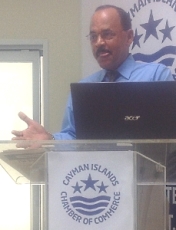
Infrastructure Fund could solve dump problem
 (CNS Business): The idea of a local investment infrastructure fund may be receiving the cold shoulder from government but local businessman and former political candidate Bo Miller is urging the business community to get behind, claiming that this is the solution to Cayman’s major problems, such as addressing the dump and the sewage issues, as well as the port and airport. Speaking this week at a Chamber of Commerce ‘Be Informed’ presentation, Miller and his partners in the proposal, Samit Ghosh and Andre Wright, said that Walkers had already agreed to create the fund to raise local capital to pay for local projects while giving investors a long term return on their cash. Read more on CNS Business
(CNS Business): The idea of a local investment infrastructure fund may be receiving the cold shoulder from government but local businessman and former political candidate Bo Miller is urging the business community to get behind, claiming that this is the solution to Cayman’s major problems, such as addressing the dump and the sewage issues, as well as the port and airport. Speaking this week at a Chamber of Commerce ‘Be Informed’ presentation, Miller and his partners in the proposal, Samit Ghosh and Andre Wright, said that Walkers had already agreed to create the fund to raise local capital to pay for local projects while giving investors a long term return on their cash. Read more on CNS Business
